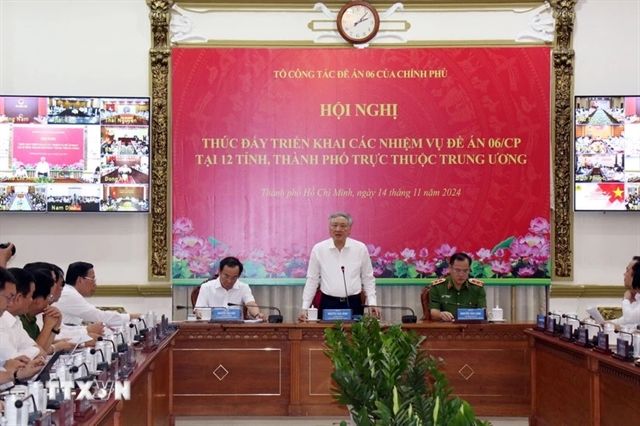VN to soon issue new resolution to accelerate digital transformation
Society – Economy - Ngày đăng : 22:24, 15/11/2024
 |
| Permanent Deputy Prime Minister Nguyễn Hòa Bình worked with the people's committees of 12 central-level localities at a conference held in HCM City on November 14 to promote the implementation of Project 06 on accelerating national digital transformation. — VN/VNS Photo Tiến Lực |
HCM CITY — In November, the Politburo will issue a new resolution on national digital transformation, Permanent Deputy Prime Minister Nguyễn Hòa Bình said at a conference held in HCM City on November 14.
Bình chaired the conference with the people's committees of 12 central-level provinces and cities to promote the implementation of Project 06 that focuses on developing the application of population data, e-identification and authentication for national digital transformation in the 2022-25 period, with a vision to 2030.
The new resolution will include many solutions combined with the implementation of programmes under Project 06, he said.
Many digital transformation and information technology experts point out that one of the weaknesses is that Việt Nam’s database construction remains fragmented and does not yet have large data centres.
“The goal of Project 06 is to build large data centres,” he said.
Implementing digital transformation in areas such as electronic health records, criminal records, and land and civil status is very important but some localities have not completed them, he said.
He asked the localities to pay more attention to implementing national digital transformation programmes and Project 06.
According to statistics, up to now, the whole country has integrated 14.8 million citizen’s electronic health records into the electronic health book data on the VNeID application.
As of November 13, 47 localities have deployed the issuance of 24,887 criminal records on VNeID, and 15 localities have completed digitising civil status data.
Colonel Vũ Văn Tấn, deputy director of the Department of Administrative Police for Social Order under the Ministry of Public Security, said HCM City has digitised 12.8 million civil status records (100 per cent), while Bình Dương Province has basically completed the task.
The remaining 10 localities are at risk of not completing the plan to digitise civil status data this year, he said.
Kiên Giang has not yet implemented it, while Nam Định and Ninh Thuận provinces have only achieved one per cent and 16 per cent, respectively.
The Ministry of Public Security requested the localities to urgently complete digitisation, and use digitised civil status and land data to reduce administrative procedures.
They should focus on completing digitisation and cleaning up data on judicial records, criminal records, and expungement documents before March 31, 2025 to shorten the processing time for issuing criminal record certificates.
Digital transformation is an objective requirement and an inevitable trend globally in the context of the Fourth Industrial Revolution. It has been present in the daily activities of each person and each family.
Việt Nam regards digital transformation as a strategic choice and a top priority for rapid, sustainable development, and called on ministries, agencies, localities and the entire society to join hands in spurring socio-economic development based on digital transformation, science-technology, innovation and start-ups.
Project 06 is a highlight and a key task of national digital transformation over the past years, with Hà Nội and HCM City tapped for pilot implementation.
It aims to serve five main groups, including administrative procedures and providing online public services; economic and social development; digital citizens; connecting the ecosystem, exploit and enrich residential data; and the direction and administration of leaders at all levels.
In short, the VNeID application or the electronic chip-embedded CCCD card will gradually replace citizens' documents in a number of transactions as prescribed by law, providing public services, commercial services serving citizens' digital utilities such as residential services, e-commerce, e-payment and other services. — VNS
